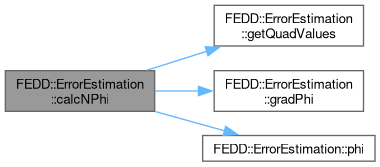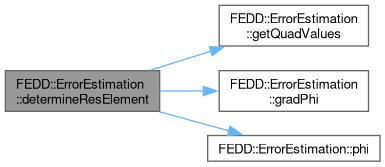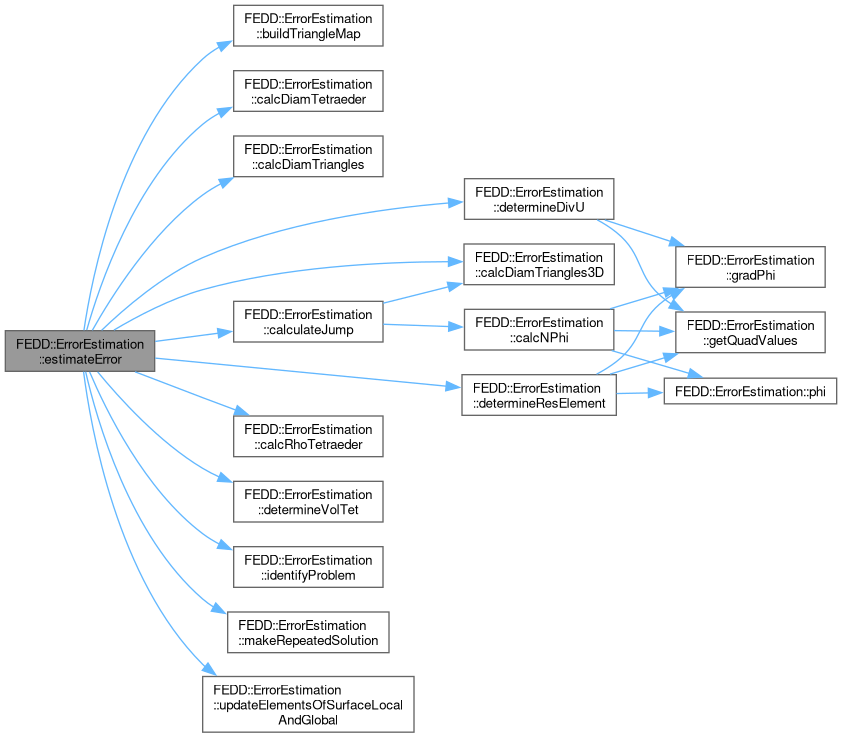Public Types | |
| typedef Teuchos::RCP< MeshUnstructured< SC, LO, GO, NO > > | MeshUnstrPtr_Type |
| typedef Elements | Elements_Type |
| typedef Teuchos::RCP< Elements_Type > | ElementsPtr_Type |
| typedef EdgeElements | EdgeElements_Type |
| typedef Teuchos::RCP< EdgeElements_Type > | EdgeElementsPtr_Type |
| typedef SurfaceElements | SurfaceElements_Type |
| typedef Teuchos::RCP< SurfaceElements_Type > | SurfaceElementsPtr_Type |
| typedef Map< LO, GO, NO > | Map_Type |
| typedef Map_Type::MapPtr_Type | MapPtr_Type |
| typedef Map_Type::MapConstPtr_Type | MapConstPtr_Type |
| typedef MultiVector< SC, LO, GO, NO > | MultiVector_Type |
| typedef Teuchos::RCP< MultiVector_Type > | MultiVectorPtr_Type |
| typedef MultiVector< LO, LO, GO, NO > | MultiVectorLO_Type |
| typedef Teuchos::RCP< MultiVectorLO_Type > | MultiVectorLOPtr_Type |
| typedef Teuchos::RCP< const MultiVector_Type > | MultiVectorConstPtr_Type |
| typedef Teuchos::OrdinalTraits< LO > | OTLO |
| typedef Matrix< SC, LO, GO, NO > | Matrix_Type |
| typedef Teuchos::RCP< Matrix_Type > | MatrixPtr_Type |
| typedef BlockMultiVector< SC, LO, GO, NO > | BlockMultiVector_Type |
| typedef Teuchos::RCP< BlockMultiVector_Type > | BlockMultiVectorPtr_Type |
| typedef Teuchos::RCP< const BlockMultiVector_Type > | BlockMultiVectorConstPtr_Type |
Public Member Functions | |
| ErrorEstimation (int dim, std::string problemType, bool writeMeshQuality_) | |
| ErrorEstimation is initiated with the dimension and problemType, as it is necessary to fit errorEstimation to the problem at hand. | |
| MultiVectorPtr_Type | estimateError (MeshUnstrPtr_Type inputMeshP12, MeshUnstrPtr_Type inputMeshP1, BlockMultiVectorConstPtr_Type valuesSolution, RhsFunc_Type rhsFunc, std::string FEType) |
| Main Function for a posteriori error estimation. | |
| void | identifyProblem (BlockMultiVectorConstPtr_Type valuesSolution) |
| Identifying the problem with respect to the degrees of freedom and whether we calculate pressure. By telling how many block the MultiVector has, we can tell whether we calculate pressure or not. Depending on the numbers of entries within the solution vector, we can tell how many degreesOfFreedom (dofs) we have. | |
| void | makeRepeatedSolution (BlockMultiVectorConstPtr_Type valuesSolution) |
| We split the solution from the BlockMultiVector valuesSolution into one or more seperate blocks, where the blocks represent the different dimensions. | |
| vec3D_dbl_Type | calcNPhi (std::string phiDerivative, int dofsSol, std::string FEType) |
| Function that calculates the jump part for nabla u or p. | |
| vec_dbl_Type | calculateJump () |
| Part of the error estimator that calculates the jump part of the estimation. What kind of jump is calculated depends on the problemType we have at hand. | |
| vec2D_dbl_Type | gradPhi (int dim, int intFE, vec_dbl_Type &p) |
| Calcutlating the gradient of phi depending on quad points p. | |
| vec_dbl_Type | phi (int dim, int intFE, vec_dbl_Type &p) |
| Calcutlating phi depending on quad points p. | |
| MultiVectorPtr_Type | determineCoarseningError (MeshUnstrPtr_Type mesh_k, MeshUnstrPtr_Type mesh_k_m, MultiVectorPtr_Type errorElementMv_k, std::string distribution, std::string markingStrategy, double theta) |
| DetermineCoarseningError is the essential part of the mesh coarsening process. | |
| double | determineResElement (FiniteElement element, RhsFunc_Type rhsFunc) |
| Function that that determines ||\Delta u_h + f ||_(L2(T)), || \Delta u_h + f - \nabla p_h ||_T or || \Delta u_h + f - \nabla p_h - (u_h \cdot \nabla)u_h||_T for an Element T. | |
| double | determineDivU (FiniteElement element) |
| Function that that determines || div(u) ||_T for a Element T. | |
| vec2D_dbl_Type | getQuadValues (int dim, std::string FEType, std::string Type, vec_dbl_Type &QuadW, FiniteElement surface) |
| Returns neccesary quadrature Values. Is distinguishes between needing Element or Surface information. | |
| void | markElements (MultiVectorPtr_Type errorElementMv, double theta, std::string strategy, MeshUnstrPtr_Type meshUnstr) |
| Function that marks the elements for refinement. | |
| vec_dbl_Type | determineVolTet (ElementsPtr_Type elements, vec2D_dbl_ptr_Type points) |
| function, that determines volume of tetrahedra. | |
| vec_dbl_Type | calcDiamTriangles (ElementsPtr_Type elements, vec2D_dbl_ptr_Type points, vec_dbl_Type &areaTriangles, vec_dbl_Type &rho_T, vec_dbl_Type &C_T) |
| Calculating the diameter of triangles. | |
| vec_dbl_Type | calcDiamTriangles3D (SurfaceElementsPtr_Type surfaceTriangleElements, vec2D_dbl_ptr_Type points, vec_dbl_Type &areaTriangles, vec_dbl_Type &rho_T, vec_dbl_Type &C_T) |
| Calculating the diameter of triangles. | |
| vec_dbl_Type | calcDiamTetraeder (ElementsPtr_Type elements, vec2D_dbl_ptr_Type points, vec_dbl_Type volTet) |
| Calculating the circumdiameter of tetraeder. | |
| vec_dbl_Type | calcRhoTetraeder (ElementsPtr_Type elements, SurfaceElementsPtr_Type surfaceTriangleElements, vec_dbl_Type volTet, vec_dbl_Type areaTriangles) |
| Calcutlating the incircumdiameter of tetrahedra. | |
| vec_dbl_Type | determineAreaTriangles (ElementsPtr_Type elements, EdgeElementsPtr_Type edgeElements, SurfaceElementsPtr_Type surfaceElements, vec2D_dbl_ptr_Type points) |
| Calculating the area of the triangle elements of tetrahedra. | |
| void | buildTriangleMap () |
| Build Surface Map. Contrary to building the edge map, building the surface map is somewhat simpler as elementsOfSurfaceGlobal and elementsOfSurfaceLocal already exist. Via elementsOfSurface global each surface can be uniquely determined by the two elements it connects. | |
| void | updateElementsOfSurfaceLocalAndGlobal (EdgeElementsPtr_Type edgeElements, SurfaceElementsPtr_Type surfaceTriangleElements) |
| UpdateElementsOfSurfaceLocalAndGlobal is performed here instead of in meshRefinement, as the information is only needed in case of error estimation. Equivalent function as updateElementsOfEdgeGlobal but with the important destinction, that it runs without communication and only relies on local information. | |
| void | setErrorEstimate (MultiVectorPtr_Type errorElements) |
| MultiVectorPtr_Type | getErrorEstimate () |
| void | tagArea (MeshUnstrPtr_Type meshUnstr, vec2D_dbl_Type area) |
| Tags only a certain Area for refinement and is independent of any error estimation. | |
| void | tagAll (MeshUnstrPtr_Type meshUnstr) |
| Tags only a certain Area for refinement and is independent of any error estimation. | |
| void | tagFlag (MeshUnstrPtr_Type inputMeshP1, int flag) |
Constructor & Destructor Documentation
◆ ErrorEstimation()
| FEDD::ErrorEstimation< SC, LO, GO, NO >::ErrorEstimation | ( | int | dim, |
| std::string | problemType, | ||
| bool | writeMeshQuality ) |
ErrorEstimation is initiated with the dimension and problemType, as it is necessary to fit errorEstimation to the problem at hand.
- Parameters
-
[in] dim Dimension of problem. [in] problemType Type of problem. Choose between Laplace, Stokes and NavierStokes
Member Function Documentation
◆ buildTriangleMap()
| void FEDD::ErrorEstimation< SC, LO, GO, NO >::buildTriangleMap | ( | ) |
Build Surface Map. Contrary to building the edge map, building the surface map is somewhat simpler as elementsOfSurfaceGlobal and elementsOfSurfaceLocal already exist. Via elementsOfSurface global each surface can be uniquely determined by the two elements it connects.
The surfacemap is only used for error estimation. Thus it is only build here and not in the refinementFactory.

◆ calcDiamTetraeder()
| vec_dbl_Type FEDD::ErrorEstimation< SC, LO, GO, NO >::calcDiamTetraeder | ( | ElementsPtr_Type | elements, |
| vec2D_dbl_ptr_Type | points, | ||
| vec_dbl_Type | volTet ) |
Calculating the circumdiameter of tetraeder.
- Parameters
-
[in] elements Elements. [in] points Points. [in] volTet Volume of tetrahedra. [out] diamElements Uncircumdiameter of tetrahedra.

◆ calcDiamTriangles()
| vec_dbl_Type FEDD::ErrorEstimation< SC, LO, GO, NO >::calcDiamTriangles | ( | ElementsPtr_Type | elements, |
| vec2D_dbl_ptr_Type | points, | ||
| vec_dbl_Type & | areaTriangles, | ||
| vec_dbl_Type & | rho_T, | ||
| vec_dbl_Type & | C_T ) |
Calculating the diameter of triangles.
- Parameters
-
[in] elements Elements [in] points Points [out] diamElements Diameter of triangles (Uncirclediameter). [out] rho_T Incirclediameter. [out] C_T Shape parameter.

◆ calcDiamTriangles3D()
| vec_dbl_Type FEDD::ErrorEstimation< SC, LO, GO, NO >::calcDiamTriangles3D | ( | SurfaceElementsPtr_Type | surfaceTriangleElements, |
| vec2D_dbl_ptr_Type | points, | ||
| vec_dbl_Type & | areaTriangles, | ||
| vec_dbl_Type & | rho_T, | ||
| vec_dbl_Type & | C_T ) |
Calculating the diameter of triangles.
- Parameters
-
[in] elements Elements. [in] points Points. [out] diamElements Diameter of triangles.

◆ calcNPhi()
| vec3D_dbl_Type FEDD::ErrorEstimation< SC, LO, GO, NO >::calcNPhi | ( | std::string | phiDerivative, |
| int | dofsSol, | ||
| std::string | FEType ) |
Function that calculates the jump part for nabla u or p.
- Parameters
-
[in] phiDerivative phiDerivative is either 'Gradient' or 'None' and what kind of jump is calculated depends on the problemType we have at hand. If phiDerivative is 'Gradient' the nabla u jump part is caluculated and if its 'None' then the pressure jump. [in] dofsSol Degree of freedom of the caluclated jump part. The pressure dof is always 1 whereas velocity dof can vary depending on the problem. [in] FEType Finite element type of the calculated jump part.


◆ calcRhoTetraeder()
| vec_dbl_Type FEDD::ErrorEstimation< SC, LO, GO, NO >::calcRhoTetraeder | ( | ElementsPtr_Type | elements, |
| SurfaceElementsPtr_Type | surfaceTriangleElements, | ||
| vec_dbl_Type | volTet, | ||
| vec_dbl_Type | areaTriangles ) |
Calcutlating the incircumdiameter of tetrahedra.
- Parameters
-
[in] elements Elements. [in] surfaceTriangleElements TriangleElements. [in] volTet Volume of tetrahedra. [in] areaTriangles Area of faces of tetrahedra. [out] rhoElements Incircumdiameter of tetrahedra.

◆ determineAreaTriangles()
| vec_dbl_Type FEDD::ErrorEstimation< SC, LO, GO, NO >::determineAreaTriangles | ( | ElementsPtr_Type | elements, |
| EdgeElementsPtr_Type | edgeElements, | ||
| SurfaceElementsPtr_Type | surfaceElements, | ||
| vec2D_dbl_ptr_Type | points ) |
◆ determineCoarseningError()
| ErrorEstimation< SC, LO, GO, NO >::MultiVectorPtr_Type FEDD::ErrorEstimation< SC, LO, GO, NO >::determineCoarseningError | ( | MeshUnstrPtr_Type | mesh_k, |
| MeshUnstrPtr_Type | mesh_k_m, | ||
| MultiVectorPtr_Type | errorElementMv_k, | ||
| std::string | distribution, | ||
| std::string | markingStrategy, | ||
| double | theta ) |
DetermineCoarseningError is the essential part of the mesh coarsening process.
Instead of calulating an error for mesh level k, we redestribute it to lower mesh levels and refining those. We execute this function with an estimated error from level k. With this calculated error, we mark the elements according to that error and refine afterwards. If we decide to coarsen a certain mesh level, we take that level, look at the k-m level and refine that to the point where we are at the same level we wanted to perform the coarsening on.
- Parameters
-
[in] mesh_k Current mesh of level k. [in] mesh_k_m Mesh of refinement level k-m. [in] errorElementMv_k The error estimation of mesh level k. [in] distribution Either 'forwards' or 'backwards'. We determine the error estimate in level k-m with redistributing backwards. if we are in level k-m we calculate the k-m+1 mesh level error estimation via redistributing the k-m error forward. [in] markingStrategy The strategy with which element are marked. [in] theta Marking threshold.

◆ determineDivU()
| double FEDD::ErrorEstimation< SC, LO, GO, NO >::determineDivU | ( | FiniteElement | element | ) |
Function that that determines || div(u) ||_T for a Element T.
- Parameters
-
[in] element FiniteElement element where ||div(u)||_T is calculated on. [out] divElement Divergence of u_h on element


◆ determineResElement()
| double FEDD::ErrorEstimation< SC, LO, GO, NO >::determineResElement | ( | FiniteElement | element, |
| RhsFunc_Type | rhsFunc ) |
Function that that determines ||\Delta u_h + f ||_(L2(T)), || \Delta u_h + f - \nabla p_h ||_T or || \Delta u_h + f - \nabla p_h - (u_h \cdot \nabla)u_h||_T for an Element T.
- Parameters
-
[in] element FiniteElement element where ||div(u)||_T is calculated on. [in] rhsFunc The right hand side function of the pde. [out] resElement Residual of element according to problemType


◆ determineVolTet()
| vec_dbl_Type FEDD::ErrorEstimation< SC, LO, GO, NO >::determineVolTet | ( | ElementsPtr_Type | elements, |
| vec2D_dbl_ptr_Type | points ) |
function, that determines volume of tetrahedra.
- Parameters
-
[in] elements Elements. [in] edgeElements Edges. [in] points Points. [out] volumeTetrahedra Volume of tetrahedras

◆ estimateError()
| ErrorEstimation< SC, LO, GO, NO >::MultiVectorPtr_Type FEDD::ErrorEstimation< SC, LO, GO, NO >::estimateError | ( | MeshUnstrPtr_Type | inputMeshP12, |
| MeshUnstrPtr_Type | inputMeshP1, | ||
| BlockMultiVectorConstPtr_Type | valuesSolution, | ||
| RhsFunc_Type | rhsFunc, | ||
| std::string | FETypeV ) |
Main Function for a posteriori error estimation.
depending on the problem the the error estimation is calculated accordingly.
- Parameters
-
[in] inputMeshP1 The P1 Mesh that is used for later refinement. [in] inputMeshP12 The possible P2 Mesh, if one of the solutions is of P2 Discretisation, otherwise both meshes are P1. [in] solution Solution of the PDE in BlockMultiVector Format (Block 0: Velocity, Block 1: Pressure). [in] rhs The right hand side function of the pde. [in] FETypeV Finite element type as the maximum FEType for the Velocity, pressure is assumed to be P1 always.


◆ getQuadValues()
| vec2D_dbl_Type FEDD::ErrorEstimation< SC, LO, GO, NO >::getQuadValues | ( | int | dim, |
| std::string | FEType, | ||
| std::string | Type, | ||
| vec_dbl_Type & | QuadW, | ||
| FiniteElement | surface ) |
Returns neccesary quadrature Values. Is distinguishes between needing Element or Surface information.
- Parameters
-
[in] dim Dimension for which the quadrature points are needed. [in] FEType Finite element type for which the quadrature points are needed. [in] Type Type of quadrature points are need. Either 'Element' if you integrate over an element or 'Surface' if you need to integrate over a surface (i.e. for calculating the jump) [in] QuadW Vector to be filled with the quadrature weights accordingly [in] FiniteElement surface for which you need the quadrature points in case if 'Surface' type, as it is needed for figuring out the quadrature points [out] QuadPts Quadrature points [out] QuadW Quadrature weights
Keep in mind that elementwise quadPoint are defined on reference element whereas surface quadPoints are defined on the input surface, which is typically not the reference Element.

◆ gradPhi()
| vec2D_dbl_Type FEDD::ErrorEstimation< SC, LO, GO, NO >::gradPhi | ( | int | dim, |
| int | intFE, | ||
| vec_dbl_Type & | p ) |
Calcutlating the gradient of phi depending on quad points p.
- Parameters
-
[in] dim Dimension. [in] intFE Integer value of discretisation P1 (1) or P2(2). [in] p Quadpoints or other points for which phi is suppose to be evaluated. [out] gradPhi Gradient of phi with evaluated values p.

◆ identifyProblem()
| void FEDD::ErrorEstimation< SC, LO, GO, NO >::identifyProblem | ( | BlockMultiVectorConstPtr_Type | valuesSolution | ) |
Identifying the problem with respect to the degrees of freedom and whether we calculate pressure. By telling how many block the MultiVector has, we can tell whether we calculate pressure or not. Depending on the numbers of entries within the solution vector, we can tell how many degreesOfFreedom (dofs) we have.
- Parameters
-
[in] valuesSolution Blocks that contains solution for velocity and as the case may be pressure.

◆ makeRepeatedSolution()
| void FEDD::ErrorEstimation< SC, LO, GO, NO >::makeRepeatedSolution | ( | BlockMultiVectorConstPtr_Type | valuesSolution | ) |
We split the solution from the BlockMultiVector valuesSolution into one or more seperate blocks, where the blocks represent the different dimensions.
- Parameters
-
[in] valuesSolution Block that contains solution for velocity and as the case may be pressure.

◆ markElements()
| void FEDD::ErrorEstimation< SC, LO, GO, NO >::markElements | ( | MultiVectorPtr_Type | errorElementMv, |
| double | theta, | ||
| std::string | strategy, | ||
| MeshUnstrPtr_Type | meshP1 ) |
Function that marks the elements for refinement.
- Parameters
-
[in] errorElementMv MultiVector that contains the estimated error for each element. [in] theta Parameter determining for marking strategies. [in] markingStrategy Strategy with which the elements are marked. Implemented Strategies 'Doerfler' or 'Maximum'. [in] meshP1 P1 mesh which is used for later refinement and has to be the one beeing marked.
!! it is essential that the meshP1 mesh inserted here is the mesh that will be used for mesh refinement, as it contains the elementwise-information determining refinement. !!

◆ phi()
| vec_dbl_Type FEDD::ErrorEstimation< SC, LO, GO, NO >::phi | ( | int | dim, |
| int | intFE, | ||
| vec_dbl_Type & | p ) |
Calcutlating phi depending on quad points p.
- Parameters
-
[in] dim. [in] intFE integer value of discretisation P1 (1) or P2(2). [in] p Quadpoints or other points for which phi is to be evaluated. [out] phi Phi with evaluated values p.

◆ tagAll()
| void FEDD::ErrorEstimation< SC, LO, GO, NO >::tagAll | ( | MeshUnstrPtr_Type | inputMeshP1 | ) |
Tags only a certain Area for refinement and is independent of any error estimation.
- Parameters
-
[in] inputMeshP1 The P1 Mesh that is used for later refinement. [in] area Area that is suppose to be refined. If is a vector defining the area as follows: row1:[x_0,x_1] x-limits, row2: [y_0,y_1] y-limits, row3: [z_0,z_1] z-limits .

◆ tagArea()
| void FEDD::ErrorEstimation< SC, LO, GO, NO >::tagArea | ( | MeshUnstrPtr_Type | inputMeshP1, |
| vec2D_dbl_Type | area ) |
Tags only a certain Area for refinement and is independent of any error estimation.
- Parameters
-
[in] inputMeshP1 The P1 Mesh that is used for later refinement. [in] area Area that is suppose to be refined. If is a vector defining the area as follows: row1:[x_0,x_1] x-limits, row2: [y_0,y_1] y-limits, row3: [z_0,z_1] z-limits .

◆ updateElementsOfSurfaceLocalAndGlobal()
| void FEDD::ErrorEstimation< SC, LO, GO, NO >::updateElementsOfSurfaceLocalAndGlobal | ( | EdgeElementsPtr_Type | edgeElements, |
| SurfaceElementsPtr_Type | surfaceTriangleElements ) |
UpdateElementsOfSurfaceLocalAndGlobal is performed here instead of in meshRefinement, as the information is only needed in case of error estimation. Equivalent function as updateElementsOfEdgeGlobal but with the important destinction, that it runs without communication and only relies on local information.
- Parameters
-
[in] edgeElements Edes. [in] surfaceTriangleElements Triangle elements.

The documentation for this class was generated from the following files:
- feddlib/amr/ErrorEstimation_decl.hpp
- feddlib/amr/ErrorEstimation_def.hpp